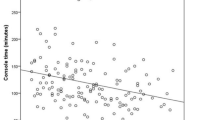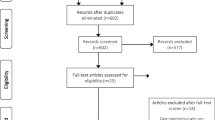Abstract
Introduction
Robotic-assisted rectal cancer surgery offers multiple advantages for surgeons, and it seems to yield the same clinical outcomes as regards the short-time follow-up of patients compared to conventional laparoscopy. This surgical approach emerges as a technique aiming at overcoming the limitations posed by rectal cancer and other surgical fields of difficult access, in order to obtain better outcomes and a shorter learning curve.
Material and methods
A systematic review of the literature of robot-assisted rectal surgery was carried out according to the Preferred Reporting Items for Systematic Reviews and Meta-Analyses (PRISMA) statement. The search was conducted in October 2015 in PubMed, MEDLINE and the Cochrane Central Register of Controlled Trials, for articles published in the last 10 years and pertaining the learning curve of robotic surgery for colorectal cancer. It consisted of the following key words: “rectal cancer/learning curve/robotic-assisted laparoscopic surgery”.
Results
A total of 34 references were identified, but only 9 full texts specifically addressed the analysis of the learning curve in robot-assisted rectal cancer surgery, 7 were case series and 2 were non-randomised case-comparison series. Eight papers used the cumulative sum (CUSUM) method, and only one author divided the series into two groups to compare both. The mean number of cases for phase I of the learning curve was calculated to be 29.7 patients; phase II corresponds to a mean number 37.4 patients. The mean number of cases required for the surgeon to be classed as an expert in robotic surgery was calculated to be 39 patients.
Conclusion
Robotic advantages could have an impact on learning curve for rectal cancer and lower the number of cases that are necessary for rectal resections.

Similar content being viewed by others
References
Miyajima N, Fukunaga M, Hasegawa H, Tanaka J, Okuda J, Watanabe M, Japan Society of Laparoscopic Colorectal Surgery (2009) Results of a multicenter study of 1,057 cases of rectal cancer treated by laparoscopic surgery. Surg Endosc 23:113–118
Guillou PJ, Quirke P, Thorpe H, Walker J, Jayne DG, Smith AM, Heath RM, Brown JM, MRC CLASICC trial group (2005) Short-term endpoints of conventional versus laparoscopic-assisted surgery in patients with colorectal cancer (MRC CLASICC trial): multicentre, randomised controlled trial. Lancet 365:1718–1726
Staudacher C, Vignali A (2010) Laparoscopic surgery for rectal cancer: the state of the art. World J Gastrointest Surg 2:275–282
Lujan J, Gonzalez A, Abrisqueta J, Hernandez Q, Valero G, Abellán I, Frutos MD, Parrilla P (2014) The learning curve of laparoscopic treatment of rectal cancer does not increase morbidity. Cir Esp 92:485–490
Park IJ, Choi GS, Lim KH, Kang BM, Jun SH (2009) Multidimensional analysis of the learning curve for laparoscopic resection in rectal cancer. J Gastrointest Surg 13:275–281
Tekkis PP, Senagore AJ, Delaney CP, Fazio VW (2005) Evaluation of the learning curve in laparoscopic colorectal surgery: comparison of right-sided and left-sided resections. Ann Surg 242:83–91
Pigazzi A, Ellenhorn JD, Ballantyne GH, Paz IB (2006) Robotic assisted laparoscopic low anterior resection with total mesorectal excision for rectal cancer. Surg Endosc 20:1521–1525
Jiménez Rodríguez RM, Díaz Pavón JM, De la Portilla De Juan F, Prendes Sillero E, Cadet Dussort JMH, Padillo J (2011) Prospective, randomized, short-term outcome study: robotic assisted laparoscopic surgery versus conventional laparosocpic surgery in colorectal carcinoma resection. Cir Esp 89:432–438
Kwak JM, Kim SH, Kim J, Son DN, Baek SJ, Cho JS (2011) Robotic vs laparoscopic resection of rectal cancer: short-term outcomes of a case–control study. Dis Colon rectum 54:151–156
Akmal Y, Baek JH, McKenzie S, Garcia-Aguilar J, Pigazzi A (2012) Robot-assisted total mesorectal excision: is there a learning curve? Surg Endosc 26:2471–2476
Jimenez-Rodriguez RM, Diaz-Pavon JM, de la Portilla de Juan F, Prendes-Sillero E, Dussort HC, Padillo J (2013) Learning curve for robotic-assisted laparoscopic rectal cancer surgery. Int J Color Dis 28:815–821
Bokhari MB, Patel CB, Ramos-Valadez DI, Ragupathi M, Haas EM (2011) Learning curve for robotic-assisted laparoscopic colorectal surgery. Surg Endosc 25:855–860
Kim YW, Lee HM, Kim NK, Min BS, Lee KY (2012) The learning curve for robot-assisted total mesorectal excision for rectal cancer. Surg Laparosc Endosc Percutan Tech 22:400–405
Yamaguchi T, Kinugasa Y, Shiomi A, Sato S, Yamakawa Y, Kagawa H, Tomioka H, Mori K (2015) Learning curve for robotic-assisted surgery for rectal cancer: use of the cumulative sum metho. Surg Endosc 29:1679–1685
Sng KK, Hara M, Shin JW, Yoo BE, Yang KS, Kim SH (2013) The multiphasic learning curve for robot-assisted rectal surgery. Surg Endosc 27:3297–3307
Park JS, Choi GS, Lim KH, Jang YS, Jun SH (2011) S052: a comparison of robot-assisted, laparoscopic, and open surgery in the treatment of rectal cancer. Surg Endosc 25:240–248
Park EJ, Kim CW, Cho MS, Baik SH, Kim DW, Min BS, Lee KY, Kim NK (2014) Multidimensional analyses of the learning curve of robotic low anterior resection for rectal cancer: 3 phase learning process comparison. Surg Endosc 28:2821–2831
Kim HJ, Choi GS, Park JS, Park SY (2014) Multidimensional analysis of the learning curve for robotic total mesorectal excision for rectal cancer: lessons from a single surgeon’s experience. Dis Colon rectum 57:1066–1074
Park EJ, Kim CW, Cho MS, Baik SH, Kim DW, Min BS, Lee KY, Kim NK (2014) Is the learning curve of robotic low anterior resection shorter than laparoscopic low anterior resection for rectal cancer? A comparative analysis of clinicopathologic outcomes between robotic and laparoscopic surgeries. Medicine (Baltimore) 93:e109
Melich G, Hong YK, Kim J, Hur H, Baik SH, Kim NK, Sender Liberman AS, Min BS (2015) Simultaneous development of laparoscopy and robotic provides acceptable perioperative outcomes and shows robotics to have a faster learning curve and to be overall faster in rectal cancer surgery: analysis of novice MIS surgeon learning curves. Surg Endosc 29:558–568
Foo CC, Law WL (2016) The learning curve of robotic-assisted low rectal resection of a novice rectal surgeon. World J Surg 40:456–462
Huang CW, Yeh YS, Ma CJ, Choy TK, Huang MY, Huang CM, Tsai HL, Hsu WH, Wang JY (2015) Robotic colorectal surgery for laparoscopic surgeons with limited experience: preliminary experiences for 40 consecutive cases at a single medical center. BMC Surg 18(15):73
Bege T, Lelong B, Esterni B, Turrini O, Guiramand J, Francon D, Mokart D, Houvenaeghel G, Giovannini M, Delpero JR (2010) The learning curve for the laparoscopic approach to conservative mesorectal excision for rectal cancer: lessons drawn from a single institution’s experience. Ann Surg 251:249–253
Kayano H, Okuda J, Tanaka K, Kondo K, Tanigawa N (2011) Evaluation of the learning curve in laparoscopic low anterior resection for rectal cancer. Surg Endosc 25:2972–2979
Son GM, Kim JG, Lee JC, Suh YJ, Cho HM, Lee YS, Lee IK, Chun CS (2010) Multidimensional analysis of the learning curve for laparoscopic rectal cancer surgery. J Laparoendosc Adv Surg Tech A 20:609–617
Ito M, Sugito M, Kobayashi A, Nishizawa Y, Tsunoda Y, Saito N (2009) Influence of learning curve on short-term results after laparoscopic resection for rectal cancer. Surg Endosc 23:403–408
Liberati A, Altman DG, Tetzlaff J, Mulrow C, Gotzsche PC, Ioannidis JP, Clarke M, Devereaux PJ, Kleijnen J, Moher D (2009) The PRISMA statement for reporting systematic reviews and meta-analyses of studies that evaluate health care interventions: explanation and elaboration. J Clin Epidemiol 62:e1–34
Heal RJ, Husband EM, Rayall RD (1982) The mesorectum in rectal cancer surgery—the clue to pelvic recurrence? Br J Surg 69:613–616
Biondo S, Ortiz H, Lujan J, Codina-Cazador A, Espin E, García-Granero E, Kreisler E, de Miguel M, Alos R, Echeverria A (2010) Quality of mesorectum after laparoscopic resection for rectal cancer—results of an audited teaching programme in Spain. Color Dis 12:24–31
Ortiz H, Wibe A, Ciga MA, Lujan J, Codina A, Biondo S (2013) Spanish Rectal Cancer Project. Impact of a multidisciplinary team training programme on rectal cancer outcomes in Spain. Color Dis 15:544–551
Ortiz H, Codina A, Grupo Colaborador Proyecto Vickingo (2013) The Spanish Association of surgeon’s audited teaching programme for rectal cancer. Results after six years. Cir Esp 91:496–503
Adamina M, Champagne BJ, Hoffman L, Ermlich MB, Delaney CP (2011) Randomized clinical trial comparing the cost and effectiveness of bipolar vessel sealers versus clips and vascular staplers for laparoscopic colorectal resection. Br J Surg 98:1703–1712
Sanabria A, Vega V, Dominguez LC, Espitia E, Serna A, Osorio C (2014) The evolution of laparoscopy in abdominal surgery: a meta-analysis of the effect on infectious outcomes. Minim Invasive Ther Allied Technol 23:74–86
Laurent C, Leblanc F, Bretagnol F, Capdepont F, Rullier E (2008) Long term wound advantages of the laparoscopic approach in rectal cancer. Br J Surg 95:903–908
Rottoli M, Bona S, Rosati R, Elmore U, Bianchi PP, Spinelli A, Bartolucci C, Montorsi M (2009) Laparoscopic rectal resection for cancer: effects of conversion on short-term outcome and survival. Ann Surg Oncol 16:1279–1286
Park S, Kim NK (2015) The role of robotic surgery for rectal cancer: overcoming technical challenges in laparoscopic surgery by advanced techniques. J Korean Med Sci 30:837–846
Luján J, Valero G, Hernández Q, Sánchez A, Frutos MD, Parrilla P (2009) Randomized clinical trial comparing laparoscopic and open surgery in patients with rectal cancer. Br J Surg 96:982–989
Van der Pas MH, Haglind E, Cuesta MA, Furst A, Lacy AM, Hop WC, Bonjer HJ (2013) Colorectal cancer laparoscopic or open resection II (COLOR II) Study Group. Laparoscopic versus open surgery for rectal cancer (COLOR II): short-term outcomes of a randomised, phase 3 trial. Lancet Oncol 14:210–218
Jackson TD, Kaplan GG, Arena G, Page JH, Rogers SO Jr (2007) Laparoscopic versus open resection for colorectal cancer: a metaanalysis of oncologic outcomes. J Am Coll Surg 204:439–446
Noel JK, Fahrbach K, Estok R, Cella C, Frame D, Linz H, Cima RR, Dozois EJ, Senagore AJ (2007) Minimally invasive colorectal resection outcomes: short term comparison with open procedures. J Am Coll Surg 204:291–307
Targarona EM, Balagué C, Pernas JC, Martinez C, Berindoague R, Gich I, Trias M (2008) Can we predict immediate outcome after laparoscopic rectal surgery? Multivariate analysis of clinical, anatomic and pathologic features after 3-dimensional reconstruction of the pelvic anatomy. Ann Surg 247:642–649
Weber PA, Merola S, Wasielewski A, Ballantyne GH (2002) Telerobotic-assisted laparoscopic right and sigmoid colectomies for benign disease. Dis Colon rectum 45:1689–1694
Lee SH, Lim S, Kim JH, Lee KY (2015) Robotic versus conventional laparoscopic surgery for rectal cancer: systematic review and meta-analysis. Ann Surg Treat Res 89:190–201
Yang Y, Wang F, Zhang P, Shi C, Zou Y, Qin H, Ma Y (2012) Robot-assisted versus conventional laparoscopic surgery for colorectal disease, focusing on rectal cancer: a meta-analysis. Ann Surg Oncol 19:3727–3736
Ortiz Oshiro E, Sanchez Egido I, Moreno Sierra J, Perez CF, Diaz JS, Fernandez Represa JA (2012) Robotic assistance may reduce conversion to open in rectal carcinoma laparoscopic surgery: systematic review and meta-analysis. Int J Med Robot 8:360–370
Byrn JC, Hrabe JE, Charlton ME (2014) An initial experience with 85 consecutive robotic-assisted rectal dissections: improved operating times and lower costs with experience. Surg Endosc 28:3101–3107
Author information
Authors and Affiliations
Corresponding author
Additional information
Summary
Robotic surgery represents a technological revolution in the management of rectal cancer. This approach has several advantages, and one of them could be the reduction in surgical learning curve.
Rights and permissions
About this article
Cite this article
Jiménez-Rodríguez, R.M., Rubio-Dorado-Manzanares, M., Díaz-Pavón, J.M. et al. Learning curve in robotic rectal cancer surgery: current state of affairs. Int J Colorectal Dis 31, 1807–1815 (2016). https://doi.org/10.1007/s00384-016-2660-0
Accepted:
Published:
Issue Date:
DOI: https://doi.org/10.1007/s00384-016-2660-0




